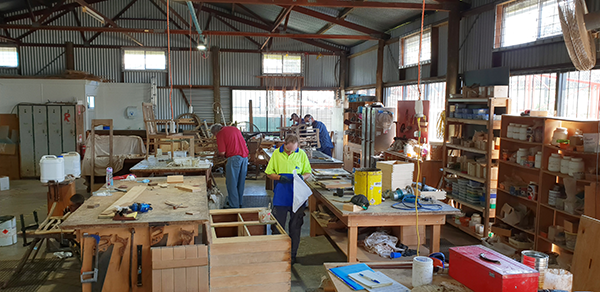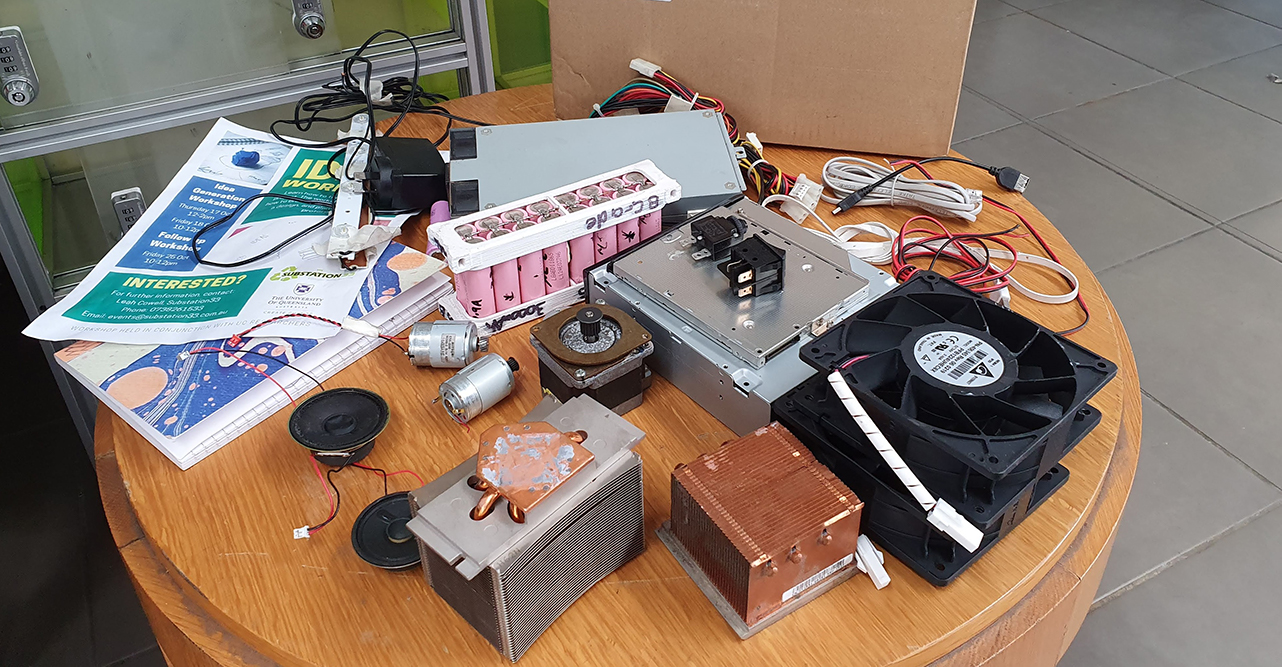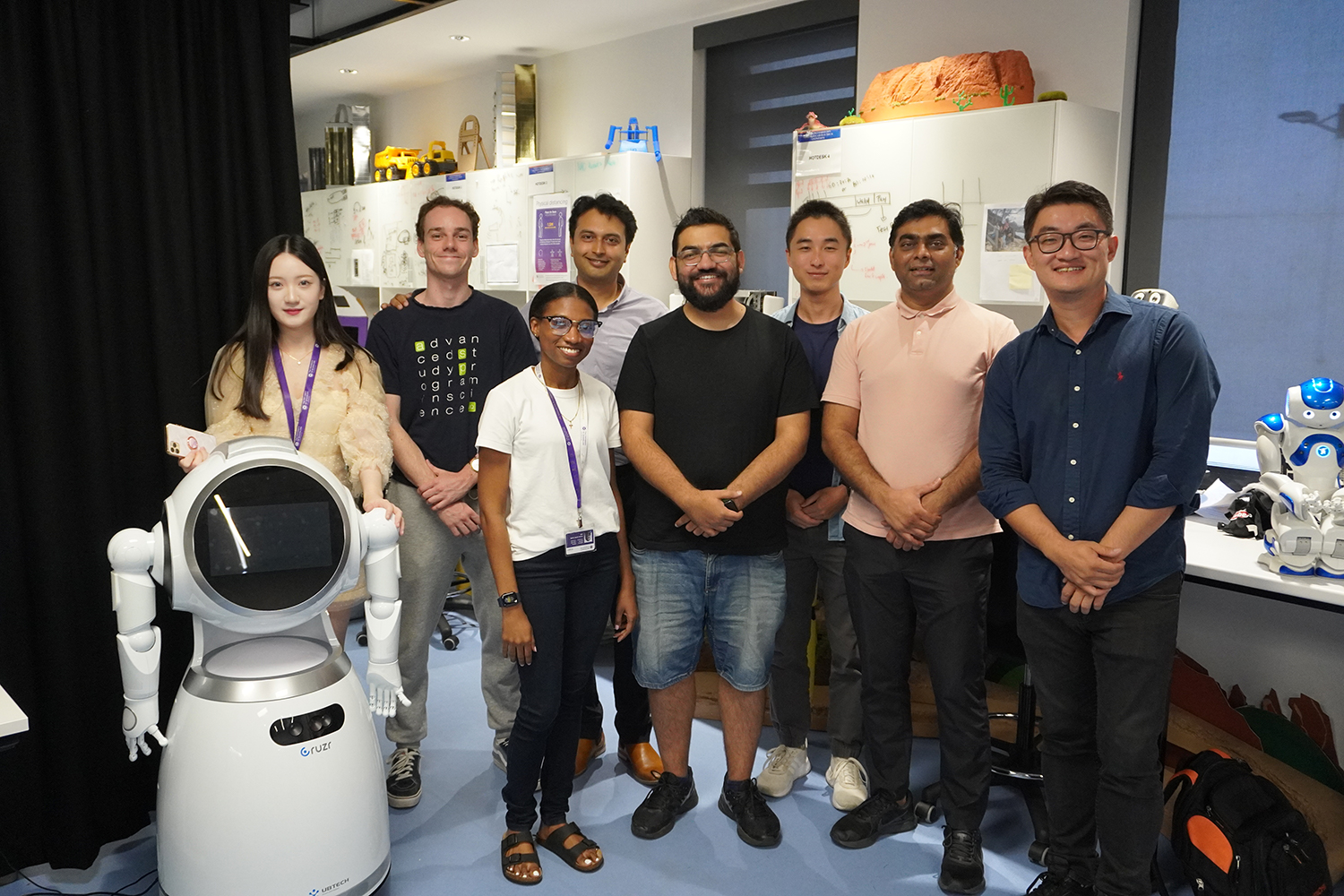Fostering DIY and making practices in low socioeconomic communities, ARC - DE180100687
DIY and making in non-traditional environments

Contrary to known stereotypes, people from economically disadvantaged backgrounds often demonstrate resourceful and creative behaviors that can be molded towards entrepreneurship and employment generating opportunities.
The Do-It-Yourself (DIY) and makerspace movements have shown the potential for high-tech innovation, democratizing production and creativity, and revamping of economies and broken educational systems. However, within HCI, the focus has mainly been on more affluent and technology-savvy population.
HCI lacks the narrative on how DIY and making practices are associated with economically disadvantaged members of the community. In particular, the role of innovation hubs such as makerspaces and community-based social enterprises in uplifting the economically disadvantaged needs to be thoroughly investigated.
Initial efforts in this domain have shown that Makerspaces have the potential in supporting effective STEM education, presenting an opportunity to bring traditionally underrepresented groups into STEM fields.
Extensive ethnographic fieldwork, participatory design workshops and technology trials have been conducted in men’s sheds, an e-waste recycling center, woodworking workshops, women’s knitting groups and a community makerspace.
e-Waste Recycling and Making
 A set of studies have been conducted across a range of e-waste recycling centers, where the aim was to explore how e-waste can be used as a resource for create new ideas and technologies. Here, a detailed ethnographic fieldwork in e-waste recycling centers was conducted which lead to an understanding of various recycling practices and strategies; followed by hackathons where participants created technology ideas from e-waste.
A set of studies have been conducted across a range of e-waste recycling centers, where the aim was to explore how e-waste can be used as a resource for create new ideas and technologies. Here, a detailed ethnographic fieldwork in e-waste recycling centers was conducted which lead to an understanding of various recycling practices and strategies; followed by hackathons where participants created technology ideas from e-waste.
Intersectional Women and Making
Making, in the context of makerspaces, is often articulated in utopian terms. The utopian vision of making is postulated to transform the self, democratize the tools of production, and result in positive social, economic and political impacts. However, despite the utopian visions of democratic participation and low barriers to entry, the dominant culture of makerspaces is masculine, technocentric, and white. Women, particularly women of colour, such as refugees, migrants and Indigenous women, who have faced a lifetime of social, economic and cultural intersectional constraints, which have in turn limited their access to education and employment, continue to also miss out on using makerspaces, or are confined to makerspaces which offer craft oriented activities.
This project aims to identify the factors that enable access and utility of STEM oriented makerspaces for women of diverse backgrounds and the factors that constrain participation, which will lead to the design of a conceptual framework for an intersectional makerspace.

Awais Hameed Khan, Hongyi Tao, Franklin Khristi, and David Chiu
(Sonali Hedditch not in the photo)
Making and wellbeing
DIY and Making within makerspaces and men's sheds may bring positive health outcomes for individuals. Men’s sheds are community spaces where retired men can socialize and cooperatively organize and conduct craftwork type activities (predominantly – woodworking). Men’s sheds can be conceptualized as maker organizations as they involve DIY and making of wooden objects. HCI and CSCW literature has increasingly shown the importance of positive health outcomes from being involved in makerspace-type environments. This project aims to provide insights into what making is like in a men’s shed and how it connects to wellbeing of individuals. A set of ICT applications are developed as a result of this project that will help support and enhance wellbeing in men's sheds.
Personal Fabrication using Mixed-Reality
Users (in HCI) have become makers – due to their abilities beyond using, such as repurposing, reusing, building, and maintaining. Digital fabrication tools, like 3D printers, CNC routers, electrical components, are becoming easier to access in makerspaces, but the barrier to entry for personal fabrication remains high, which still need to develop multiple STEM skills. While emerging technologies like extended reality (XR) provide more immersive prototyping methods. Using XR systems it would be possible to guide non-experts or people with low digital literacy to design products and living environments to meet their specific needs, and complete making, fabrication or construction by themselves. Moreover, XR is likely to be beneficial for the ecology and mobilization of personal fabrication by providing immersive knowledge sharing and real-time collaboration. Overall, this project is aiming to understand traditional makers, identify challenges they face, and explore opportunities how XR could support everyday making.
Making & Entrepreneurship
This research will look at DIY and maker culture practices that lead to entrepreneurship and then seek to improve those practices with informed design technology solutions. Entrepreneurship arising from the maker movement is not an altogether new phenomenon. Some maker-entrepreneurs have capitalized on the shared digital economy to advance their efforts. However, the success of maker-entrepreneurs reaching and sustaining their desired financial stability is worth investigating further. This research will be conducted by engaging with makers from low socio-economic communities and examining ways in which they currently try to build their micro-businesses.
Publications
- Hongyi Tao and Dhaval Vyas. (2025). “Housing Diversity Means Diverse Housing”: Blending Generative AI into Speculative Design in Rural Co- Housing Communities. In CHI Conference on Human Factors in Computing Systems (CHI ’25), April 26-May 1, 2025, Yokohama, Japan. ACM, New York, NY, USA, 17 pages. https://doi.org/10.1145/3706598.3713906
- Dhaval Vyas, Franklin Khristi & Peter Worthy (2024). “Making for Others”: A Creative Inquiry into Understanding Older Men’s Motivations for Making. International Journal of Human–Computer Interaction, 1–11. Taylor and Francis. https://doi.org/10.1080/10447318.2024.2387917
- Sonali Hedditch, and Dhaval Vyas. (2024). Building New Clubhouses: Bridging Refugee and Migrant Women into Technology Design and Production. Proceedings of the ACM Human Computer Interaction. Volume 8: CSCW
- Dhaval Vyas, Raunaq Bahl. (2023). ShedBox: Enabling Digital Storytelling in Men’s Sheds. Behaviour & Information Technology. Page 1-17. Taylor and Francis. https://doi.org/10.1080/0144929X.2023.2242510
- Chuike Lee, Stephen Viller, Dhaval Vyas. 2023. PDF Refugee Entrepreneurial Trajectories. Proceedings of the ACM Human Computer Interaction. Volume 7: CSCW2, Art 355. 24 pages. https://doi.org/10.1145/3610204
- Khan, Awais Hameed, Sabie, Samar, and Vyas, Dhaval (2023). The pragmatics of sustainable unmaking: informing technology design through e-waste folk strategies. Proceedings of Designing Interactive Systems (DIS ’23), Philadelphia, PA USA, 10-14 July 2023. https://doi.org/10.1145/3563657.3596056
- Chuike Lee, Stephen Viller, Dhaval Vyas. 2023. Refugee Entrepreneurial Trajectories. Proceedings of the ACM Human Computer Interaction. 7, CSCW2, Article 355 (October 2023), 26 pages. https://doi.org/10.1145/3610204
- Dhaval Vyas, Awais Hameed Khan and Anabelle Cooper. 2023. Democratizing Making: Scaffolding Participation Using e-Waste to Engage Under-resourced Communities in Technology Design. In Proceedings of the 2023 CHI Conference on Human Factors in Computing Systems (CHI '23), April 23-28, 2023, Hamburg, Germany. ACM, New York, NY, USA, 23 Pages. https://doi.org/10.1145/3544548.3580759
- Hongyi Tao and Dhaval Vyas. 2023. Making Practices in Pursuit of Ecological Ethos: Learnings from Three Ecovillages in Australia. International Journal of Human-Computer Interaction. Mar. p.1-17 https://doi.org/10.1080/10447318.2023.2188537
- Sonali Hedditch and Dhaval Vyas. 2023. Crossing the Threshold: Pathways into Makerspaces for Women at the Intersectional Margins. Proceedings of the ACM Human Computer Interaction, 7, CSCW1, Article 123 (April 2023), 40 pages, https://doi.org/10.1145/3579599
- Tao, H., Vyas, D. (2022). Making in/with Nature: Lessons from an Eco-village for Sustainable Making. In: Bruyns, G., Wei, H. (eds) [ ] With Design: Reinventing Design Modes. IASDR 2021. Springer, Singapore. https://doi.org/10.1007/978-981-19-4472-7_1
- Dhaval Vyas, Abigail Durrant and John Vines (2022). Engaging with Under-Resourced Communities for User Research through Self-Reported Videos. Proceedings of the ACM Human Computer Interaction. Volume 6: CSCW2, Article 513 (Nov 2022), 26 pages. https://doi.org/10.1145/3555626
- Dhaval Vyas and Diogo Quental (2022). “It’s just like doing meditation”: Making at a Community Men’s Shed. Proceedings of the ACM Human Computer Interaction. Volume 6: GROUP6, 27 pages. https://doi.org/10.1145/3567564
- Hongyi Tao, Dhaval Vyas (2021) DIY Homes: Placemaking in Rural Eco-Homes. In: Petrie H., Winckler M., Zaphiris P. (eds) Human-Computer Interaction – INTERACT 2021. INTERACT 2021. Lecture Notes in Computer Science. Springer, Cham. https://doi.org/10.1007/978-3-030-85613-7_25
- India Anderson, and Dhaval Vyas (2022). Shedding Ageist Perceptions of Making: Creativity in Older Adult Maker Communities. In Creativity and Cognition (C&C ’22). Association for Computing Machinery, New York, NY, USA, 208–219. https://doi.org/10.1145/3527927.3532800
- Sonali Hedditch, and Dhaval Vyas (2022). Design justice in practice: community led design of an online maker space for refugee and migrant women. Proceedings of the ACM on Human-Computer Interaction, Volume 7, Issue GROUP01 January 2023 Article No.: 4. pp 1–39 https://doi.org/10.1145/3567554
- Sonali Hedditch and Dhaval Vyas (2021). A Gendered Perspective on Making from an Autoethnography Study in Makerspaces. In Proceedings of the Designing Interactive Systems Conference 2021 (DIS ‘21), June 28-July 2, 2021, Association for Computing Machinery, New York, NY, USA. DOI: https://doi.org/10.1145/3461778.3462015
- Upul Rathnayake, Thilina Halloluwa, Pradeepa Bandara, Medhani Narasinghe, Dhaval Vyas (2021) Exploring Entrepreneurial Activities in Marginalized Widows: A Case from Rural Sri Lanka. Proceedings of the ACM on Human-Computer Interaction. Volume 5: Issue 1: Computer-Supported Cooperative Work and Social Computing 2021. https://doi.org/10.1145/3449216
- Dhaval Vyas. 2020. Life Improvements: DIY in Low Socio-economic Status Communities. In Conference Companion Publication of the 2020 on Computer Supported Cooperative Work and Social Computing (CSCW '20). Association for Computing Machinery, New York, NY, USA, 407–412. DOI: https://doi.org/10.1145/3406865.3418325
- Dhaval Vyas. 2019. Altruism and Wellbeing as Care Work in a Craft-based Maker Culture. Proc. Proceedings of the ACM on Human-Computer Interaction. 3, GROUP, Article 239 (December 2019), 12 pages. DOI: https://doi.org/10.1145/3361120
- Dhaval Vyas and John Vines. 2019. Making at the Margins: Making in an Under-resourced e-Waste Recycling Center. Proceedings of the ACM on Human-Computer Interaction. 3, CSCW, Article 188 (November 2019), 23 pages. DOI: https://doi.org/10.1145/3359290
- Jennyfer Lawrence Taylor, Dhaval Vyas, and Tony Sharp. 2017. Diversity and coherence in a hackerspace for people from a low socioeconomic community. In Proceedings of the 29th Australian Conference on Computer-Human Interaction (OZCHI '17). Association for Computing Machinery, New York, NY, USA, 238–247. DOI: https://doi.org/10.1145/3152771.3152797
Get in touch
For more information about this project, please get in touch with Dr Dhaval Vyas. We welcome collaboration opportunities:
Dr Dhaval Vyas
e: d.vyas@uq.edu.au
Project members
Academic Staff
PhD/MPhil Students
Franklin Khristi (2020)
Sonali Hedditch (2020)
Chuike Lee (2021)
Hongyi Tao (2021)
Pinyao Song (2022)
Thesis Students
Shao Qi Tan (2020)
Raunaq Bahl (2020)
Daniel Henley (2021)
Akash Iyer (2022)
Hayden Padget (2022)
Raghav Sharma (2020)
Liwen Jin (2020)
Aman Javed (2021)
Hongyi Tao (2019)
Pinyao Song (2021)
Anabelle Cooper (2019)

